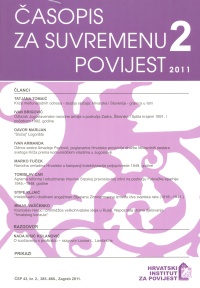Intelektualni i društveni angažman Stjepana Zimmermanna između dva svjetska rata (1918.–1941.)
STJEPAN ZIMMERMANN’S INTELLECTUAL AND SOCIAL ENGAGEMENT BETWEEN WORLD WARS (1918-1941)
Author(s): Stipe KljajićSubject(s): History
Published by: Hrvatski institut za povijest
Keywords: Stjepan Zimmerman; neo-scholastics; Croatian Catholic movement; liberalism; Marxism; Yugoslav Croatism; Croatian national individuality; HSS
Summary/Abstract: Stjepan Zimmermann (1884-1963) was one of the leading Croatian philosophers of the first half of the past century, an adherent of the neo-scholastic school of thought. During the interwar period he worked as a prominent scholar and cultural worker in various institutions as a member of the Academy and Matica Hrvatska, a rector of the University of Zagreb, the Dean of the Faculty of Theology, and president of the association of high school teachers in Zagreb. In the intellectual culture of his time he was at first involved in a polemic with the representatives of liberalism in the fields of philosophy and psychology with Albert Bazala (1877-1947) and Ramir Bujas (1879-1959). Later in the 1930s he was concerned in his philosophical texts with the phenomenon of Marxism, so he entered into debate with the left wing intellectuals August Cesarec and Miroslav Krleža on the questions of atheism and the valorization of Christianity, as well as the moral justification of social revolution and a materialist understanding of the world. In terms of political matters, in the beginning phase of the new Yugoslav state he supported the concept of Yugoslav Croatism, which called for the integration of the Croat people in the wider Yugoslav state community, up until the assassination of Croat representatives in the Belgrade parliament in 1928. After that, during the 1930s at the time when the Croat national question and the status of the Church in connection with the concordat crisis occupied the main stage of political affairs, Zimmerman was allied to the circle of intellectuals of Catholic provenance who advocated for the abandonment of the Yugoslav cultural and political milieu, or the concept of Croatian national individuality. Following such positions on the part of Zimmerman, a polemic against Ivan Meštrović (1883-1962) developed on the eve of World War Two about the necessity of extirpating the Yugoslav identity from the Academy in Zagreb. He had a negative attitude toward the Croatian Peasant Party (HSS) as the carrier of the Croat national question during the interwar period because of liberal ideas and to some degree because of the anti-intellectualism of its ideologies, thus he saw Banovina Hrvatska as a one-party dictatorship resulting from a compromise between the HSS and the Serbian political elite, which had betrayed Zimmerman’s ideal of creating an independent Croatian state.
Journal: Časopis za suvremenu povijest
- Issue Year: 43/2011
- Issue No: 2
- Page Range: 551-576
- Page Count: 26
- Language: Croatian

